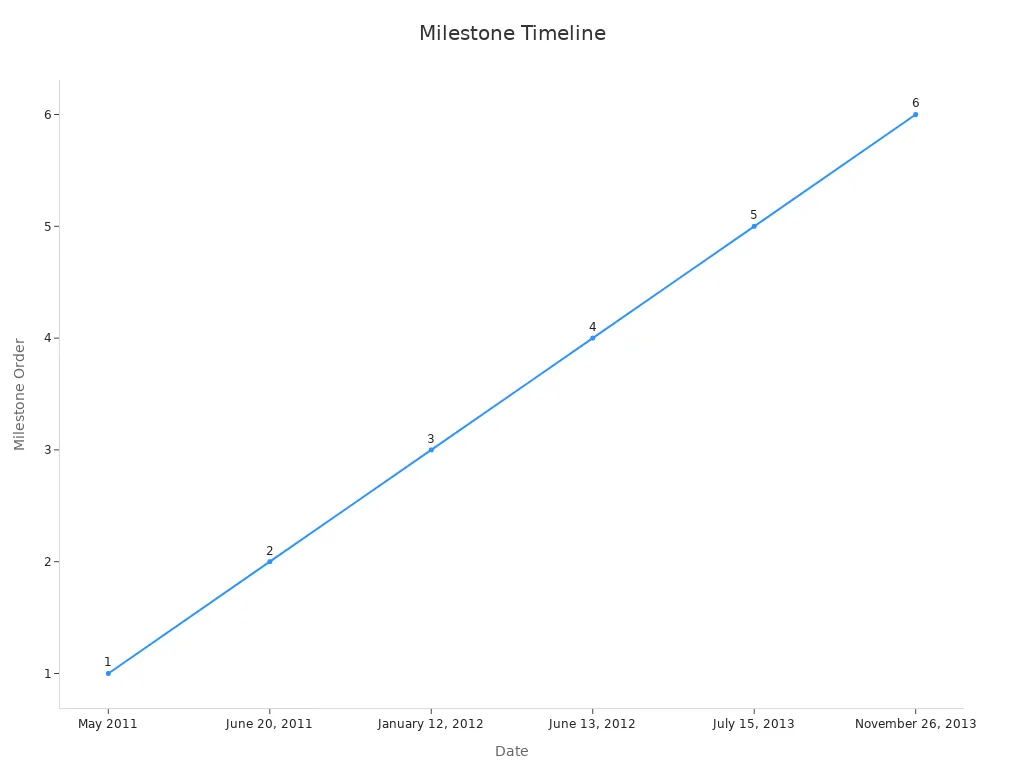The Future of Domain Registration: Predictions for 2030 Published: 23 Apr, 2025

The internet is a big part of our daily lives. Domain registration helps shape how the internet works. Every website starts with a domain name. This makes it very important for the online world. The future of domain registration matters to everyone. It helps you build your online presence and protect your identity. This is important for both businesses and personal brands.
Many things are changing how domains work. New technology, more worries about online safety, and the need for unique names are big factors. These changes will affect how you use the internet. They will also give you new ways to stand out online.
Key Takeaways
- More unique domain choices will be available soon. New domain types and special extensions will help you be noticed online.
- Blockchain will make domains safer. It lowers fraud risks and makes owning and transferring domains easier.
- AI tools will help you pick the best domain. These tools suggest names that fit your brand and needs.
- Voice search is changing how we pick domain names. Short and easy names are better for voice searches.
- Keep up with new domain trends. AI, IoT, and blockchain are changing how domains work.
Understanding the Evolution of Domain Registration
From the first domains to the rise of gTLDs
Domain registration has changed a lot over time. In the 1980s, the Domain Name System (DNS) was created. This system let people use easy names instead of hard-to-remember numbers. It made using the internet simpler. By 1985, the first business domain, symbolics.com, was registered by Symbolics Inc. This started a new chapter for online identity.
In 1990, anyone could register a domain. This gave people and companies a way to be online. Over the years, more people wanted domain names. Generic top-level domains (gTLDs) like .com, .org, and .net became popular. These extensions helped with branding and being noticed online.
The growth of gTLDs didn’t stop there. In 2011, the Internet Corporation for Assigned Names and Numbers (ICANN) decided to add more domain options. This led to hundreds of new gTLDs, like .tech, .store, and .blog. These new choices made it easier to find a domain that fits your needs.
Milestones shaping the current domain landscape
The history of domain registration includes many important moments. Here are some key events:
| Year | Event Description |
|---|---|
| 1980s | DNS was created, linking easy names to number addresses. |
| 1985 | The first business domain, symbolics.com, was registered. |
| 1990 | Domains became available to everyone, helping people go online. |
The shift to gTLDs brought big changes too. In 2011, ICANN allowed more gTLDs to be made. By 2012, ICANN got nearly 1,930 applications for new gTLDs. The first new gTLDs were launched in late 2013, changing domains forever.

These events show how domain registration has grown to meet online needs. They also show how you can use new domains to stand out online.
Key Predictions for the Future of Domain Registration
More TLDs and niche extensions are coming
The future will offer more domain name options. New top-level domains (TLDs) and niche extensions will help you stand out. These new choices will let businesses and people find domains that fit their goals.
This trend is already growing. Emoji domains are becoming trendy. Experts think they will get big investments by 2025. Imagine owning a domain with a smiley face or heart emoji. It’s fun, unique, and easy to remember. Industry-specific domains like .software for tech or .green for eco-friendly brands are also popular. These domains show your expertise and connect better with your audience.
Language-specific domains are also exciting. They help businesses reach local customers. For example, a French bakery could use a .fr domain to attract French-speaking buyers. This move toward niche extensions shows how domain registration is changing to meet different needs.
Tip: Want a unique domain? Check out these new TLDs early. They can help you build a strong online presence.
Blockchain will change domain ownership and safety
Blockchain technology will make domain registration safer. It uses a decentralized system to secure domain ownership. With blockchain, you don’t need a central authority to own a domain. This lowers fraud risks and ensures your domain is truly yours.
One big benefit of blockchain is stopping domain theft. Traditional systems store domain data in central databases, which hackers can attack. Blockchain uses a shared ledger that’s very hard to hack. This keeps your domain safe from cyber threats.
Blockchain also makes transferring domains easier. Smart contracts, powered by blockchain, automate secure transactions. This makes buying and selling domains faster and safer. As blockchain grows, it will play a big role in domain registration.
AI tools for better domain search and choices
Artificial intelligence (AI) is changing how you pick domain names. AI tools study your preferences and suggest names that match your brand. This makes finding the right domain quicker and easier.
Big companies already use AI for personalization. Warner Bros. Discovery used AI tools to boost user engagement by 14%. Spotify uses AI to create playlists, making users happier and increasing revenue. These examples show how AI can improve domain registration.
AI also helps avoid boring or spammy names. It lets you connect with your audience in a real and personal way. For domain registration, this means finding names that fit your identity and appeal to your audience.
Note: As AI improves, smarter tools will help you find the best domains. These tools will keep you ahead in the online world.
Voice search and its impact on domain names
Voice search is changing how we use the internet. Devices like smart speakers and virtual assistants let people search by speaking. This change affects how you should pick domain names.
When using voice search, people often ask full questions. For example, they might say, "Where’s the nearest bakery?" instead of typing "nearby bakery." Short and simple domain names work better for this. A name like bestbakery.com is easier for voice assistants to understand than a long or tricky one.
Local results are also important in voice search. If you own a local business, adding your city to your domain helps. For example, seattlebakery.com makes it easier for Seattle customers to find you.
Tip: Pick domain names that are easy to say and spell. This helps with voice search and makes them easier to remember.
New ways to protect domains and privacy
Keeping domains safe will be a big focus in the future. Cyber threats are getting smarter, so protecting your domain is very important. Hackers can steal data or harm your business by attacking your domain.
New tools like big data and machine learning help stop attacks. These tools study lots of data to find risks before they happen. They can even predict attacks years ahead, giving you time to prepare.
Blockchain is another way to keep domains safe. It uses a shared system to store domain details, making it harder for hackers to break in. This keeps your domain secure and under your control.
Note: Using strong security tools now can prevent big problems later. Stay updated on new ways to protect your domain.
Changes in domain prices and buying trends
The domain market is changing, and prices are shifting. Short, catchy domains are becoming more expensive. Businesses pay more for names that improve their brand and visibility.
At the same time, new top-level domains (TLDs) offer cheaper options. Extensions like .tech, .store, and .blog cost less and help you stand out online.
Domain auctions and resale platforms are also growing. Sites like Sedo and GoDaddy Auctions make it easier to find unique names. But popular domains can get pricey. Buying early can save you money later.
Callout: Planning ahead is key. Securing a good domain now can give you an advantage as the market changes.
Emerging Technologies Shaping Domain Registration

The role of Web3 and decentralized platforms
Web3 is changing how we use the internet. It focuses on decentralization, giving you more control over your online assets like domain names. Instead of traditional systems, Web3 uses blockchain for better security and transparency.
- Decentralized finance (DeFi) platforms are growing fast. By 2024, they reached over $500 billion in total value locked (TVL). This shows how quickly people are adopting decentralized systems.
- Artificial intelligence (AI) makes decentralized apps (dApps) smarter. These tools study user behavior, improve security, and make transactions smoother.
- Machine learning in dApps helps by giving better content suggestions and faster processes.
Web3 makes domain ownership safer and free from central control. This gives you more confidence to manage your digital identity.
Augmented reality and virtual asset domains
Augmented reality (AR) is opening new doors for virtual asset domains. These domains connect digital experiences with real-world interactions. Many businesses already use AR to engage customers in creative ways.
| Case Study | Description |
|---|---|
| U.S. Air Force | Used mixed reality training to help people learn better. |
| Hitachi Energy | Showed complex products to customers using AR. |
| DreamCorp | Made historical sites more fun with AR for tourists. |
| INFINITI | Created in-store AR experiences for better product viewing. |
| 19 Crimes | Shared product stories with AR to engage buyers. |
These examples show how AR makes virtual domains more exciting. Imagine owning a domain that offers cool, interactive experiences for your audience.
IoT and its impact on domain usage
The Internet of Things (IoT) connects devices and changes how domains are used. Each IoT device needs its own unique name, increasing the need for domains. This is especially important in industries like healthcare, smart cities, and energy.
| Domain | Contribution Level |
|---|---|
| Health Care | High (Americas) |
| Smart Supply Chain | High (Americas) |
| Smart City | High (Europe) |
| Smart Energy | Significant |
| Smart Vehicle | Significant |
IoT domains help manage connected devices better. They also give businesses new ways to grow and innovate in the digital world.
Challenges and Opportunities Ahead

Fighting domain squatting and online threats
Domain squatting and cybercrime are big problems for domain owners. Criminals register domains that look like famous brands. These fake sites can hurt your reputation and trick customers. For example, phishing scams use similar domains to steal private details.
| Victim Type | Problems They Face |
|---|---|
| Domain Owners | Risk of losing trust if criminals misuse their brand. |
| Fake Email Users | Chance of losing personal data to fake email services. |
| General Users | Higher risk of being tricked by phishing websites. |
To stay safe, watch your domain and brand reputation closely. Tools like domain scoring can spot harmful sites. This helps you act against squatters and protect users. Follow these tips to avoid risks:
- Check email sender addresses carefully.
- Don’t click strange links or download unknown files.
- Use antivirus software for extra safety.
Keeping domain prices fair and exclusive
Premium domains are in high demand and often cost a lot. Short, catchy names are expensive, making them hard to afford. Smaller businesses may struggle to buy them. But new TLDs like .tech or .blog are cheaper options. These let you create a unique identity without spending too much.
Domain auctions and resale sites also help find good names. Buying early can save money later. By choosing niche extensions, you can balance cost and exclusivity while building your brand.
New ways for businesses to use domains
Domains are more than just website addresses now. They help businesses stand out. For example, a tech company might pick .ai, while a charity could use .org. These choices make it easier to connect with your audience.
Augmented reality and virtual domains bring fresh ideas too. Imagine using your domain for fun, interactive experiences. This can attract customers and show off your brand in creative ways. Using these ideas can help you stay ahead online.
Preparing for the Future of Domain Registration
How businesses can adjust to future changes
Businesses need to stay ready for changes in domain registration. You can prepare by using smart strategies to handle new trends. Here are three helpful methods:
| Method | What It Does |
|---|---|
| Environmental Scanning | Watch trends in politics, economy, society, and technology to find chances for growth. |
| Horizon Scanning | Predict changes in rules, markets, or technology to avoid surprises. |
| Scenario Planning | Plan for different possible futures by imagining key changes. |
These methods help you spot chances early and avoid risks. For example, environmental scanning can show trends like new niche TLDs or blockchain domains. Scenario planning helps you prepare for things like price changes or security issues. Using these tools keeps your business ahead in the domain world.
Tip: Check your domain list often. Make sure it matches your long-term plans. This keeps your online presence strong and useful.
Steps for individuals to grab great domains early
Getting a good domain name early is a big advantage. Follow these simple tips to get started:
- Move fast: Good domain names sell quickly. Register one as soon as you find it.
- Plan ahead: Pick a name that fits your future goals. Avoid trendy names that might not last.
- Try new TLDs: Extensions like .tech or .blog are unique and affordable. They help you stand out.
- Use AI tools: AI tools can suggest creative names based on your needs. These tools make finding the right domain easier.
Note: Choose a domain that’s short, easy to spell, and memorable. This helps with branding and voice search.
By following these tips, you can secure a domain that boosts your online identity and supports your goals.
Keeping up with new domain trends
Learning about new domain trends is important for staying ahead. Technologies like AI, IoT, and blockchain are changing the domain market. Staying informed helps you spot new chances and adapt quickly.
Here’s how to stay updated:
- Do research: Look at data and trends to learn about new ideas.
- Watch competitors: See how others in your field use domains creatively.
- Read industry news: Follow newsletters and patents to learn about new tools and methods.
New technologies are shaping domains. For example, AI makes tasks faster, IoT connects devices, and blockchain keeps domains secure. By staying informed, you can adjust your plans and stay competitive.
Callout: Sign up for newsletters and join webinars to stay informed. Knowledge helps you succeed.
The future of domain registration brings new ways to grow. You can stay ahead by using trends like AI, blockchain, and unique domain extensions. Adapting early helps you stay competitive as things change.
- Try new technologies to improve your online strategy.
- Use data to spot trends and plan smarter.
- Focus on eco-friendly choices for lasting success.
- Get ready for AI and quantum computing advances.
- Study past events to prepare for future challenges.
Using these ideas can help you build a strong online presence and succeed in the domain world.
FAQ
What is a TLD, and why is it important?
A TLD, or top-level domain, is the part after the dot in a website name (like .com or .org). It’s important because it shows what the website is about and helps users understand its purpose.
How does blockchain make domains safer?
Blockchain keeps domain records in a shared system. This makes it harder for hackers to change or steal information. It also adds transparency and lowers fraud risks, giving you more control over your domain.
Are niche TLDs better than common ones like .com?
Niche TLDs, such as .tech or .blog, can be better if they match your brand or industry. They make your domain unique and easier to remember. But traditional TLDs like .com are still trusted and popular.
How does voice search change domain choices?
Voice search works best with short and simple domain names. When people speak their searches, clear names are easier for devices to understand and suggest. This makes picking easy-to-say names more important.
What should you think about when buying a domain?
Choose a domain that’s short, easy to remember, and fits your brand. Avoid hard spellings or numbers. Look for new TLDs that match your field. Register early to get the best name and protect your online presence.